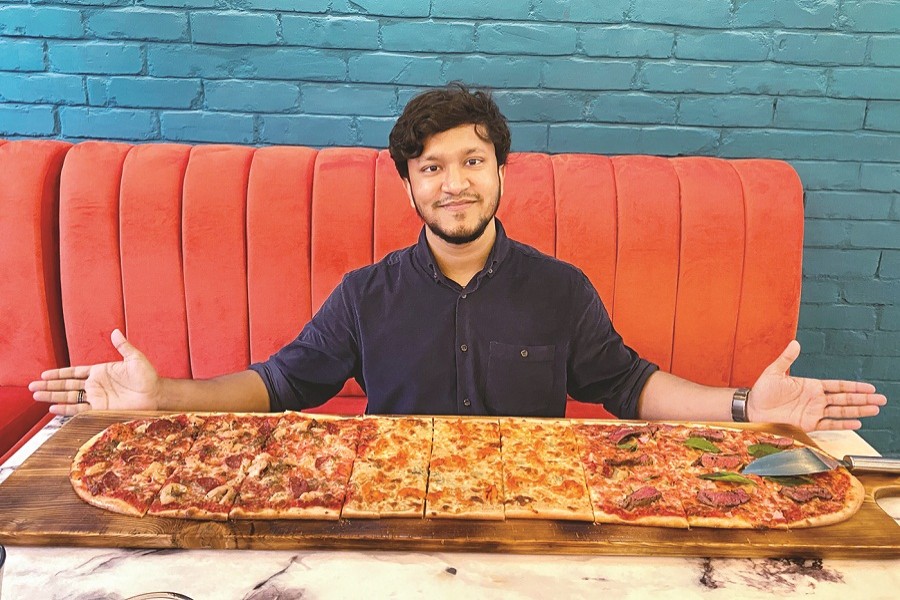Food Vlogging. The very mention of the phrase takes the readers to YouTube or Facebook videos where a person is travelling to various places and enjoying different foods while entertaining the audience. Food vlogging, or Food video blogging, is presenting the audience with videos about food. After the entertainment, food is the most searched for topic on Youtube.
Bangladesh's economic success in the 2010s has contributed much to the growth of commercialism in urban areas, and one of the sectors that saw a massive boom is the restaurant business. There are many choices out there, and it is tough to figure out the best place to spend money on food. So, here come the food vloggers, who have begun to share their opinions about the food and environment of the restaurants. It helps the audience to taste different foods or local delicacies at various places. It also promotes food tourism and introduces the cuisine to foreigners.
The Financial Express has talked to two food vloggers from two ends of the spectrum - Rasif Shafique from Petuk Couple and Shahbaz Amin Bhuiyan from Recommended Or Not to find out various aspects of food vlogging and what it stands for these days.
So, what is the role of a food vlogger? Is it just having fun while enjoying meals and rating them and introducing the audience to a wide variety of places and dishes? Or is there a bigger picture here? When asked, Shahbaz Amin has an interesting thought regarding the role of the vloggers.
"Food vloggers act as an alternative channel to promote the restaurants. Boosting posts on Facebook or Instagram is not very effective, so one of the better ways to promote restaurants, new items and new locations is through food vloggers. And as the restaurants encourage more food vloggers, knowing their sales will shoot up if one of the vlogs becomes viral, the number of vloggers has skyrocketed in recent years."
Rasif Shafique is of the same opinion, with a decent amount of disheartenment.
"Most restaurant owners are more into promoting their existing food and servicing through food vloggers, and they do not want to improve their services or the quality of their food at all. They see this as a tool for promoting their existing business."
However, an exception exists, and Rasif adds it too, "I have seen some owners recently who genuinely want us to visit their restaurant not to do a vlog, for our feedback."
One of the key aspects of food vlogging is lost due to the restaurant owners' behaviour - food preparation. Rasif Shafique sheds light on it as well, "The most important aspect of food vlogging is to show the viewers how that food is made and introduce them to the ingredients. But the problem with our restaurant culture is that they don't allow anyone to enter their kitchen."
"Most of them claim that their recipe will be stolen if the food-making process is shown. But in reality, they are afraid because of their unhygienic kitchen setup. If you see international-level food vlogs, you'll see the owners are not only allowing the vloggers to their kitchen but also they're keen to show their food-making process."
The introduction of food vlogging has changed restaurants as well. Rasif Shafique tells a story of a person who is working to start a restaurant business. He has not opened it yet and is asking about how he can improve their overall restaurant food quality and services. He thinks this practice will benefit the food sector.
Unsurprisingly, there is a conflict of interest here. If restaurants are encouraging the vloggers to promote them, paying them in one way or another, then can the reviews be trusted? Shahbaz Amin thinks that such a problem exists and will continue to exist.
"When you take payment to review a restaurant, it serves more as a promotion and less as a review. The vlog is then more concerned about letting you know about the restaurant and its food than judging the food."
"And yes, a certain level of bias will work as you can hardly ever say negative things about the product you are being paid to promote. While many authentic vloggers work without monetary benefits, they hardly ever receive mainstream attention and mostly go unnoticed," he remarked.
Another problem is paid reviews of bad foods. Many paid reviewers create a negative impression about the whole food vlogging scene. Some reviewers have little or no knowledge about culinary practices and nutrients. This creates an overall negative image. Rasif Shafique agrees to it too.
"There will always be a group of people who don't care about ethics and honesty and will run after the money. And this philosophy is applied to this industry also. Knowledge can be enriched day by day, so we do not have to worry about the newcomers with zero knowledge about food, but what we have to be aware of is the dishonest groups. This is where we have to apply common sense. But I believe that in the long run, people will be able to identify the dishonest ones because honesty speaks of its own."
There are many food vloggers around, and the audience has a justified complaint about not having quality content. The videos are getting repetitive, and the same formula is being used by most newcomers. The food vloggers should not run after the monetary benefits and try to improve the number of their contents, because food reviews are a godsend for the days when we are clueless about the best biryani near us, or where to meet to have a cup of coffee with our close ones.


